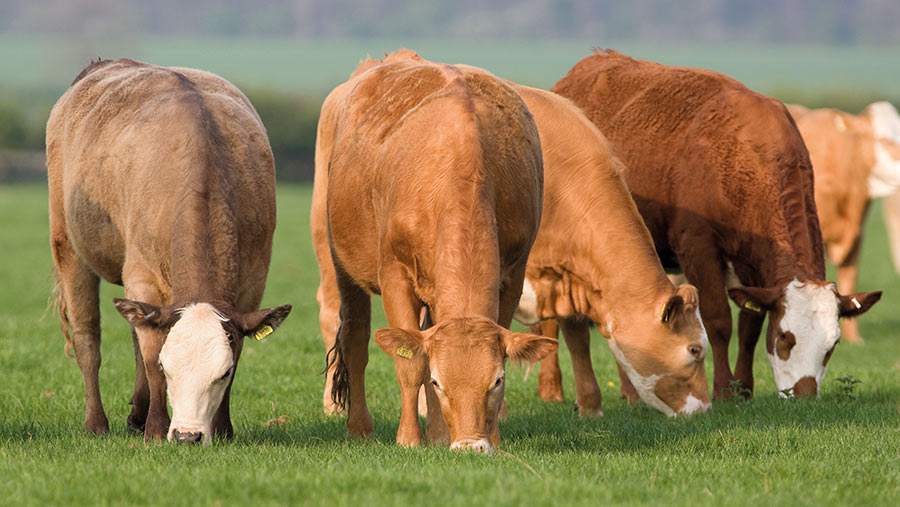Beef prices stay at record highs as trade deal looms
 © Tim Scrivener
© Tim Scrivener Finished beef prices at abattoirs and auction marts remain exceptionally high, with tight supply and good retail demand.
Further support for sales of steaks and burgers at retail for barbecues is projected with a period of warmer weather forecast.
GB deadweight steers were up 55p/kg on the same week last year to average 493.9p/kg for the week ending 20 May, while heifers averaged 491.1p/kg.
See also: Large loads of cattle make 520p/kg as carcass weights drop
Livestock marketing group Meadow Quality reported that some processors had eased their quotes slightly by 2-3p/kg, but overall GB prices remained above other prices on the Continent.
Cattle trade at auction markets also remains high, with prime cattle up overall for the week ending 23 May. Liveweight steers and heifers averaged 272.2p/kg and 283.9p/kg, respectively.
A “very firm cattle trade” was reported at Ludlow Market on 22 May, with steers averaging 293p/kg liveweight and heifers at 278p/kg.
Auctioneers say best-quality, butchers-grade cattle are selling especially well, but there is also good demand for well-fleshed cattle.
Free-trade agreements
UK free-trade deals with Australia and New Zealand are due to come into force next week, on 31 May.
Sections of the UK beef industry have been hugely nervous about the prospect of more Australian beef further pressuring a suckler cow herd that has shrunk 16.5% since 2005 to 1.46 million cattle.
Concern is mounting, with the NFU warning back in February that the deal had little to offer UK farmers and would “completely liberalise” Australian imports for beef and lamb after 10 years.
The tariff rate quota (TRQ) for Australian beef imports is initially set at 35,000t and will then increase annually to reach 110,000t after 10 years, before then being removed.
New Zealand’s TRQ will allow access for 12,000t of beef to come to the UK market tariff free in the first year, and then increase incrementally by 2,980t each year.
Economic modelling carried out by the AHDB found that the UK is unlikely to be flooded with imports from Australia and New Zealand as a result of these trade deals, due to both countries already having access to high-value Asian markets.
Results from the modelling suggested volumes of Australian beef coming to the UK following the implementation of the deal would increase by 12,000t, and by 6,300t for New Zealand imports, which remains below the TRQ.
The levy board cautioned, however, that if circumstances change, there is potential for more product to be sent to the UK, so there may be harmful consequences in the future.
National Beef Association chief executive Neil Shand has played down the negative effect of the trade deal, adding that the volume of incoming beef is likely to be limited by distance.
Mr Shand said Australian imports would most likely displace other imports, should they start to increase significantly.
